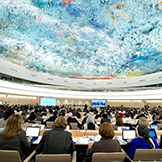Human Rights Council 35th session (6-23 June 2017)
Statement of Ireland
Ireland aligns itself with the EU statement and adds the following.
Mr President
We thank the High Commissioner for the update provided to the Council yesterday, for his ongoing work as well as that of his Office.
We strongly agree with his reminder that human rights apply across cultures and civilisations and are critical to maintenance of peace. We further agree on the key importance of implementation, including in this the third cycle of the Universal Periodic Review. We look forward to reviewing suggested lines of action from OHCHR in that regard.
We note with regret the detailed information contained in the High Commissioner’s update on the topic of lack of cooperation, or partial or selective cooperation with OHCHR, the Special Procedures of the Council and the Treaty Bodies.
As we have said in the past, no State can claim to be beyond reproach. The uncomfortable reality is that even though we commit to respect, promote and protect all human rights, we – all of us – face times where we fail to do so, in greater or lesser respects. It is vital, then, that the High Commissioner and his Office are free to challenge us to recognise where we are failing; and to support us to do better. It is for this reason that Ireland attaches such importance to the independence of the Office, as a necessary guarantee to all States that the High Commissioner and Office will at all times remain free to act impartially, without political influence or double standards.
This approach also offers the best hope for a community of States vigilant to and protective of all rights for all. And it is fully consistent with the explicit mandate of the Council, as conferred by the UN General Assembly. While the Council is in part a place for dialogue, cooperation and technical assistance, it is crucially also explicitly required to “address situations of violations of human rights, including gross and systematic violations, and make recommendations thereon”.
We encourage any State which may find reporting and other obligations an administrative burden to request technical assistance in order to assist them in fulfilling obligations and commitments deriving from the work of this Council or the Treaty Bodies.
Finally, we noted with interest the update on the possibility of remote monitoring in cases where access is repeatedly denied to OHCHR. We would be interested in further information, in due course, on whether or how such plans may be connected to broader work in the UN system, and to the preventative agenda of the UN Secretary General.
Thank you

